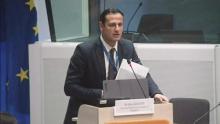The Deputy-President of NSI, Svilen Kolev, PhD, participated as a moderator in the international scientific conference “New Techniques and Technologies for Statistics” (NTTS), which was held in the period of 11 – 13 March 2025 in Brussels, Belgium. The biennial scientific conference is organized by Eurostat. More than 500 participants from over 70 countries took part in this year’s edition. The event was also broadcast online.
The Conference was opened by Mariana Kotzeva, Director-General of Eurostat, who underlined the challenges and opportunities arising from the use of Artificial Intelligence (AI) in the production of official statistics. She presented the new amendments to Regulation (EC) No. 223/2009 on European statistics, which provide national statistical institutes with access to privately held data while ensuring data security, as well as with opportunities for creating new collaborations and conducting new surveys and experimental statistics.
The purpose of the conference is both to allow the presentation of results from currently ongoing research and innovation projects in official statistics, and to stimulate and facilitate the preparation of new innovative projects with the aim of enhancing the quality and usefulness of official statistics. It discusses topics related to the impact of new techniques, methods and technologies on statistical collection, production and dissemination systems.
The extensive program of the three-day event included over 40 sessions covering various topics in the field of statistics, including the use of Big Data, Large Language Models (LLM), Artificial Intelligence (AI), web and smart surveys and new ways of data collection for the production of official statistics. Dr. Kolev moderated a session on “Streamlining Statistical Reporting”, which focused on issues related to data collection and reducing the burden on respondents.



